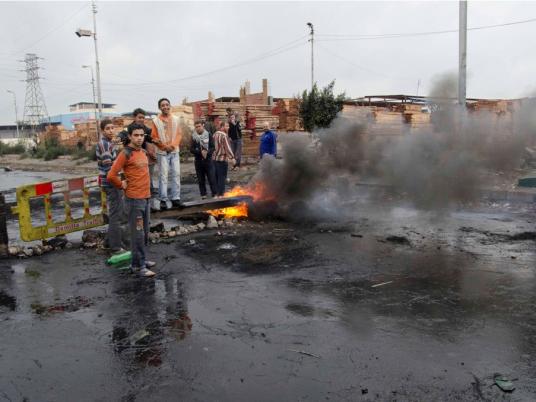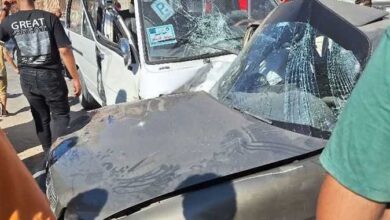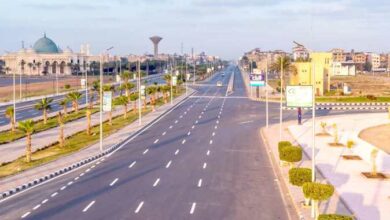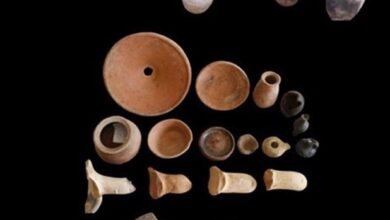
DAMIETTA — Hundreds of protesters demonstrating against expansions to a factory in this Mediterranean port city are maintaining their sit-in for an eighth day, even after clashes with security forces on Sunday left one demonstrator dead.
Meanwhile, the factory appears to be operating despite government announcements that it is to be shut down.
The sit-in, which has closed Damietta’s main roads, is against the Misr Oil Processing Company (MOPCO) factory, which residents say pollutes their town’s water.
Islam Amin Abu Abdallah, a 21-year-old protester, was killed by a bullet to the chest on Sunday, according to an official document written by the forensic doctor who examined the body.
On Sunday night, tens of thousands of protesters gathered for Abu Abdallah’s funeral, chanting against the army and the government.
Following the clashes and in a move to ease the protesters’ concerns, Egypt's ruling military council ordered the fertilizer plant to halt its work.
Mohamed Ali Feleifal, governor of Damietta, said on Sunday that the Supreme Council of the Armed Forces (SCAF) made the order after hours of bloody clashes between the army and protesters.
But on Monday, scores of protesters gathered close to the port, pointing at the smoke that could be clearly seen from the chimneys of the factory.
Protesters have said that the factory wasn't closed, as the officials had announced on Sunday.
Saber Suleiman, a driver from Kafer Saad city, a nearby town, told Al-Masry Al-Youm that he is responsible for driving the MOPCO factory workers to their morning shifts.
"Today [Monday] I drove workers to the factory as usual, but I took an alternative road due to the closure of all main roads to the port. Workers told me that the work hasn't stopped in the factory," Suleiman said.
Protesters say they are furious that the plant is still operating and they will continue their protests until it is closed. On Monday, governorate Security Director General Tarek Hamad announced that the army had released all the detainees from Sunday's clashes. That also failed to convince protesters to call off their sit-in.
But their dwindling numbers might pose a challenge.
"We are few now but this is because people are really tired because of what happened [Sunday]. Also, they are shocked by the treatment by the army," said Ayman Nasser, a university student.
Meanwhile, residents of the area say they have suffered from shortages of basic commodities due to the blocking of roads to the city.
Some protesters argue that the army’s harsh treatment is only part of the problem. The bigger issue, they say, is that SCAF is applying the same policies previously applied by the regime of the former President Hosni Mubarak.
In 2008, Damietta witnessed one of the biggest popular protests against the Mubarak's regime when thousands of residents gathered and protested against a US$1.4 billion nitrogen fertilizer project by the Canadian company Agrium.
The protests forced the government to announce that it canceled the project. The state-owned petroleum manufacturing company MOPCO then purchased rights to the project in November 2008.
The government also said that it would build the fertilizers plant on another site farther from the Ras al-Barr resort.
"They lied to us. The government only moved the project a few meters from Ras al-Barr to a new location inside the port itself," said Mohamed Ibrahim, a worker who has joined the protest.
For more than three years various scientific committees evaluated whether the plant is causing pollution. Those committees came out with contradicting conclusions, failing to agree on whether or not the plant caused pollution.
Residents of Senaniya village say that they don’t need a scientific commission to tell them that the factory is destroying the environment.
Maher Mohamed, a young fisherman from the village, showed Al-Masry Al-Youm dead fish from the canal close to the factory.
"Five years ago you wouldn't see dead fish. Having dead fish is simply because of the poisons produced by the factory. Who can say that he is satisfied with such disasters? We are losing our source of living," said Mohamed.
Farmers in the areas near the plant complain of the same phenomena. Their harvest is being damaged and the productivity of the land has decreased recently.
"This year my tomato harvest decreased. The agricultural inspector told me that it is because of the smoke from the factory. So I came here to join the people against unjustice and against the running of our lives," said Haj Ali Kemal, a farmer from Senaniya.
The sit-in started on 8 November as a small protest by some young men of the Senaniya village, who said that their village is being harmed more than anywhere else in the whole governorate from the factory's pollution.
They said that the government had failed to fulfill a promise to move the factory from its current location to another remote area.
"People of the village had gathered and discussed the issue of the negative effect of the factory two months ago. The official in the governor's office promised them to solve it," said Wael Hussein, a driver from the village.
But after two months of promises, some people of Senaniya thought to stage a protest in order to remind the officials of their demands.
"After one day of our protest, we were beaten by the army on 8 November. Some of us were detained briefly. This was the real starting point for the sit-in since we received support from people who came to join us," said Hussein.
From the second day, the sit-in has escalated when protesters blocked roads leading to the Ras al-Barr and New Damietta cities, Damietta harbor and Mansoura. They set tires on fire and pitched tents on the road.
"We are fed up with promises made by officials. We wanted to make it loud and clear that we don’t want this factory here in Damietta,” Hussein said.
Scores of protesters kept shifts to block the four main entrances to the port. Hussein told Al-Masry Al-Youm that people would not give up on their demand of closing the whole factory.
"Everybody knows that the government is making concessions because of our pressure. This is our heroism. We are all ordinary people and have nothing to do with politics. We are succeeding in achieving our demand," said Hussein.
But for Abdallah Mohamed Abdallah, the protest itself is impressive and deserves the people of Damietta’s pride.
"Here people came from all over Damietta to support us [the people of Senaniya]. They know that we are peaceful protesters. We are not thugs as the TV is describing us. We are people sincere about our cause," said Abdallah.
The Damietta sit-in comes just a few weeks ahead of parliamentary elections, but protesters said that the first post-Mubarak elections will not assuage their concerns. Candidates are either hypocrites or don’t care about the people, the protesters said.
"Can you imagine that all the electoral campaigns in Damietta didn’t mention anything about MOPCO?” says Essam Ali Haggag, a worker from Senaniya. “Some of the candidates were really rude when they came to us to convince the protesters to end their sit-in. Some candidates were hypocritical enough to tell the protesters that standing against the military council means that we the protesters are threatening national security."




